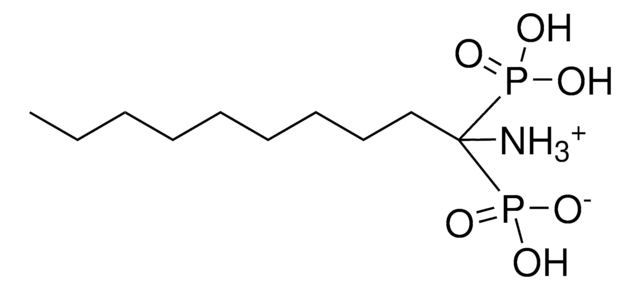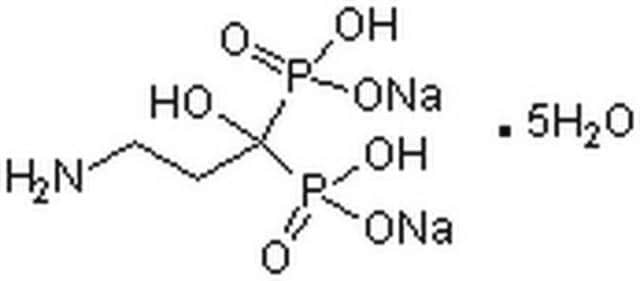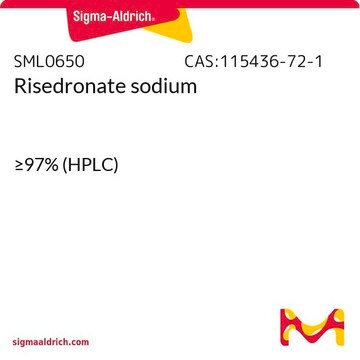A4978
Alendronate sodium trihydrate
≥97% (NMR), powder
Synonym(s):
4-amino-1-hydroxy-1-phosphonobutyl phosphonic acid, monosodium, MK-217
About This Item
Recommended Products
Assay
≥97% (NMR)
form
powder
color
white
solubility
water, double-distilled: 10 mg/mL
storage temp.
−20°C
SMILES string
[Na+].[H]O[H].[H]O[H].[H]O[H].NCCCC(O)(P(O)(O)=O)P(O)([O-])=O
InChI
1S/C4H13NO7P2.Na.3H2O/c5-3-1-2-4(6,13(7,8)9)14(10,11)12;;;;/h6H,1-3,5H2,(H2,7,8,9)(H2,10,11,12);;3*1H2/q;+1;;;/p-1
InChI key
DCSBSVSZJRSITC-UHFFFAOYSA-M
Gene Information
human ... FDPS(2224)
Looking for similar products? Visit Product Comparison Guide
Application
- for calcium phosphate nanoparticles (nCaP)/ bisphosphonate (BP) coating on titanium implants and analyze its osteogenic capacity
- in osteogenic differentiation of human bone marrow stromal cells (hBMSCs) isolated from aged osteoporosis patients- and healthy-person
- to treat osteoblast progenitor cells and osteoblasts and study their effect on osteoblast behaviors using conventional assays and simple digital image analysis
Biochem/physiol Actions
Storage and Stability
Signal Word
Warning
Hazard Statements
Precautionary Statements
Hazard Classifications
Acute Tox. 4 Oral
Storage Class Code
11 - Combustible Solids
WGK
WGK 3
Flash Point(F)
Not applicable
Flash Point(C)
Not applicable
Personal Protective Equipment
Certificates of Analysis (COA)
Search for Certificates of Analysis (COA) by entering the products Lot/Batch Number. Lot and Batch Numbers can be found on a product’s label following the words ‘Lot’ or ‘Batch’.
Already Own This Product?
Find documentation for the products that you have recently purchased in the Document Library.
Customers Also Viewed
Articles
Discover Bioactive Small Molecules for Lipid Signaling Research
Our team of scientists has experience in all areas of research including Life Science, Material Science, Chemical Synthesis, Chromatography, Analytical and many others.
Contact Technical Service











